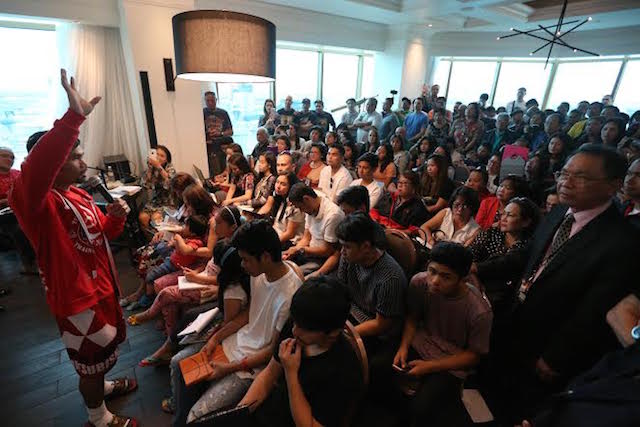
Manny Pacquiao leads Bible service inside his suite at the Delano Hotel in Las Vegas, two days before his fight against Timothy Bradley Jr. PHOTO BY REM ZAMORA
LAS VEGAS — Buy a ticket, feed a family. Purchase a pay-per-view, save a life.
If you had shelled out money in the past for a Manny Pacquiao fight, you’ve probably helped some poor community back in the Philippines. At least, that’s how the Filipino ring icon sees it.
And now Pacquiao, whose rags-to-riches story has been an open, often read book, says you can help once more–and perhaps one last time–by watching him take on Timothy Bradley Jr. for the third time Saturday at MGM Grand Arena here.
“All the pay-per-view [earnings], all the tickets you buy, I do not keep those for my family alone. [Part of that] I give to the people, to the community [that needs] help,” Pacquiao said Wednesday.
“I’ve never said [this] before and I’m announcing it right now because this is my last fight,” Pacquiao added.
Pacquiao did not exactly say what part of his earnings went to charity or what form of charity exactly he engaged in. But his generosity has never been much of a secret. Top Rank chief Bob Arum calls Pacquiao a one-man social welfare system, narrating how he once bought outboard motors for fisherfolk in a town in General Santos City in the Philippine island of Mindanao because they spent more hours getting to and from fishing areas than they did fishing.
Stories of people queueing for a whole block to this house to receive any form of doleout, cash or kind, have been retold several times.
“If Manny Pacquiao loses all his money someday,” Freddie Roach said in a trainers’ roundtable Thursday morning, “It will be because he gave them all away.”
A lot of this generosity comes from Pacquiao’s difficult life as a kid.
“You know my life. I came from nothing. The boy that’s speaking in front of you now I experienced days with no food. Sometimes, I’m hungry, I do not have food, I needed to drink water to survive,” Pacquiao said.
“That’s why I love the poor people. I love to help them.”
It would be impossible to trace what part of the public’s boxing spending goes to helping the poor. But Pacquiao has been one of the richest athletes in the world and even a fraction of that wealth is sizeable enough to help some poor family in need.
According to Forbes, Pacquiao’s earnings until the Mayweather fight could easily breach the $425 million mark, making him one of the few athletes in the world to boast such an income. That elite list includes Mayweather, Tiger Woods, Phil Mickelson, Roger Federer, LeBron James, and Kobe Bryant, who like Pacquiao also said he was calling quits on his career after this NBA season.
That income comes from a mix of guaranteed pursues, endorsement and shares of pay-per-view and ticket sales.
Since knocking out Lehlo Ledwaba in 2001, where he cashed a $40,000 paycheck and began a lucrative US career, Pacquiao has earned about $312 million in guaranteed purse. His bout against Mayweather last year, where he lost a unanimous decision, helped bump up that figure. Pacquiao was guaranteed $80 million to fight the undefeated American superstar.
The rest of the $113 million comes from PPV and gate receipts shares and from endorsements.
And, at least according to Pacquiao, a slice of that wealth has gone to charity.
“The money you spend you support us, there’s a lot of families in the Philippines you help with that,” Pacquiao said. “You can see the houses I built and [gave] for free to those who cannot afford them, and also giving sustainable livelihood [I’ve created] for them.”
“If Manny Pacquiao retires, he’ll be happy with his life helping people in the country,” Roach said.
“He spends more money on his people. Government also gives money also but Manny gives more out of his pocket than anybody. He’s a very generous person.” With reports from Inquirer Research and Francis T.J. Ochoa

